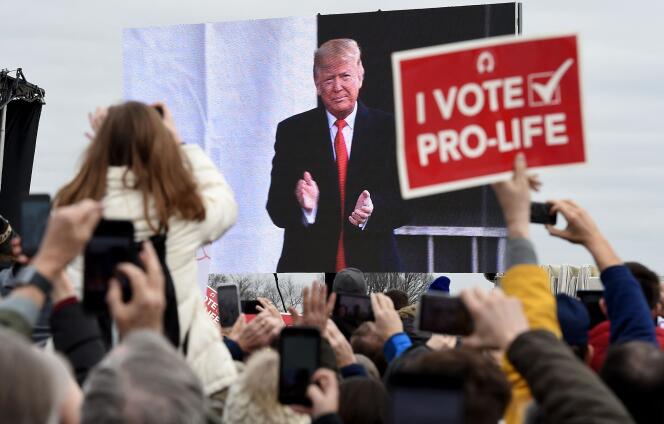


For over a year, Donald Trump avoided clarifying his position on abortion. This major social issue in the US has been driving a wedge between states enforcing repressive laws and those concerned with reproductive rights. This division has intensified since the Supreme Court's historic decision to overturn Roe vs Wade in June 2022. On Monday, April 8, the Republican candidate finally released a four-minute video on his Truth Social network. However, the video in no way closes the debate and reveals his political discomfiture.
With seven months before the presidential election, Trump said that he believes it is up to each state to decide on its own legislation. He is therefore in line with the Supreme Court's decision. The Republican candidate thanked the six conservative justices who make up the majority for their "courage," mentioning their names one by one. "I was proudly the person responsible for the ending" of the Roe vs Wade decision, said Trump. "Like Ronald Reagan," he says, he favors exceptions in cases of rape, incest or threat to the mother's life.
This change of course comes as a surprise. The candidate's recent comments suggested support for compromise federal legislation on this issue. On WABC-TV on March 20, he declared that "15 weeks [of pregnancy] seems to be a number that people are agreeing at. But I'll make that announcement at the appropriate time." Privately, Trump had expressed interest in a federal law setting the maximum time limit for voluntary termination of pregnancy at 16 weeks, more than in many European countries, such as France's 14-week threshold.
In changing tack, the former president is favoring political competence over conviction. As with everything else, his approach to abortion is purely transactional. Women's health, ethical, religious and medical issues are of little importance to him. The Christian Right, for its part, is refusing to compromise on essentials, even if it will forever be grateful to the former president for appointing three conservative Supreme Court justices.
"At the end of the day this is all about the will of the people," Trump summed up. "You must follow your heart, or in many cases your religion or your faith (...) but remember, you must also win elections to restore our culture and in fact to have our country, which is currently and very sadly a nation in decline." How do you reconcile God, the defense of life and electoral calculations?
For months, Trump hinted at his desire to overcome this contradiction. In mid-September, he spoke in Washington to an influential evangelical organization, the Family Research Council. "A lot of politicians who are pro-life don't know how to discuss this topic" and cautioned that "if they don't speak about it correctly, they're not going to win."
You have 49.02% of this article left to read. The rest is for subscribers only.
